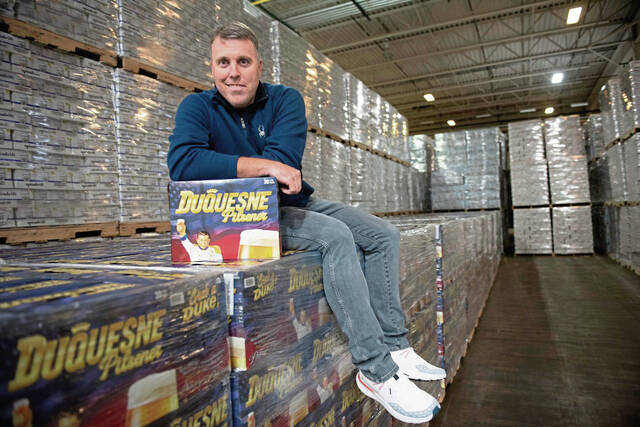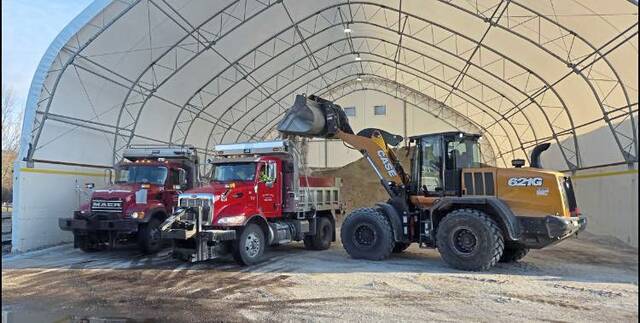An iconic Pittsburgh beer, Duquesne — with its “Prince of Pilseners” logo — has popped up again.
Bill Clevenger, whose grandmother sold Duquesne beer through her distributorship in his native McConnellsburg in Fulton County, has revived the Pittsburgh beer that had been dormant since 2021.
“I’m keeping the tradition and respecting the rich history of the brand,” said Clevenger, 47, a McConnellsburg native. “We’re holding true to the tradition — we’re an American beer for the American worker.”
Clevenger anticipates that Duquesne regular or light will be available for customers at distributorships in Southwestern Pennsylvania by the end of the month. His son runs the family’s Clevenger Beverage Connection in McConnellsburg, where he plans to sell the beer as well.
This is the second revival of the brand since Duquesne Brewing Co. in Pittsburgh dissolved more than 50 years ago after profits declined under stiff competition from national brands. The brewery that started in Pittsburgh’s South Side in 1889 sold its brands to C. Schmidt & Sons Brewing Co. of Philadelphia in 1972.
Former Upper St. Clair attorney Mark Dudash, who once worked for Pittsburgh Brewing Co., and his wife, Maria, revived Duquesne beer in August 2010 and continued to operate it until December 2021, when they retired.
“They did a wonderful job in bringing back an iconic and historic brand. I wanted to build off that foundation,” Clevenger said.
The Dudashes, who live in the Williamsburg, Va., area, said they knew Clevenger from his time as a wholesaler of Duquesne beer and they kept in contact. Clevenger reached out to them about acquiring the brand, Dudash said.
“We’re so excited that Bill is going to keep it going,” Mark Dudash said.
It took more than two years to get to the point where the brewing became a reality.
Clevenger had to acquire the rights to Duquesne Brewing, obtain state Liquor Control Board permits for brewing, transfer the trademarks to his company, obtain permits from the federal Alcohol and Tobacco Tax and Trade Bureau, and reach an agreement with City Brewing and with a master distributor, Vecenie Distributing Co. in Pittsburgh’s North Side.
“It’s like taking the Titanic and turning it around in the Mississippi River,” Clevenger said.
The new Duquesne beer is being brewed with the original recipe and packaged at the same place it was a decade ago — City Brewing Co.’s Latrobe plant.
Duquesne beer had its initial run of 2,000 barrels packaged in 14,000 cases of regular beer and 17,000 cases of light beer over the past weekend.
Clevenger said his goal is to reach 10,000 barrels produced in the first year. He has scheduled a second run of 2,000 barrels. Future packaging could be in 12-packs, as well as kegs, Clevenger said.
Clevenger declined to comment on the costs associated with acquiring the brand, the licensing and permits and paying for the brewing and packaging. He said he is working with “a strategic group of investors.”
To get the word out, Clevenger said he will use social media, its website and shaking customers’ hands in promoting Duquesne beer.
“I really believe that people are looking for a beer that has a taste that is brewed by Americans for Americans,” Clevenger said.
Good timing
The timing — packaging the beer in March — is good for Duquesne.
The NCAA basketball tournament, known as March Madness, is the 10th most popular time for beer purchases. The upcoming Memorial Day holiday is the second-most popular holiday for beer consumption, only behind the Fourth of July, according to the National Beer Wholesalers Association.
By reviving Duquesne beer, Clevenger and his group of investors are banking on getting a slice of a lucrative U.S. beer market — almost $117 billion in sales in 2023, according to the Brewers Association of Boulder, Colo. Domestic beer production in 2023 accounted for 133 million barrels of beer, including about 22.9 million in the craft beer category, the Brewers Association stated in its statistics.
It will be in competition with the national brands, as well as locally brewed Iron City, owned by Pittsburgh Brewing Co. and produced at its plant in the Creighton neighborhood of East Deer.
But Duquesne is returning to the market as beer consumption by volume dropped nationwide in 2023 by about 4.4%, to 2.68 billion 2¼-gallon cases, according to the Beverage Information Group’s 2024 Industry Overview.
Clevenger believes he can carve out a niche for Duquesne that will grow not only in Pennsylvania, but also in neighboring states as well as in the South.
“We’re talking a great beer, so why not have the rest of America enjoy it?” Clevenger said.
This story was updated March 24 to correct Maria Dudash’s name.








